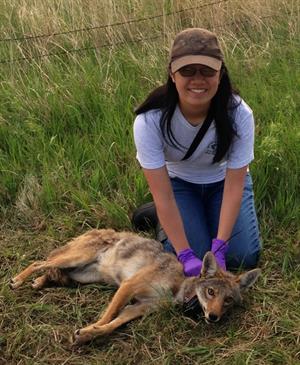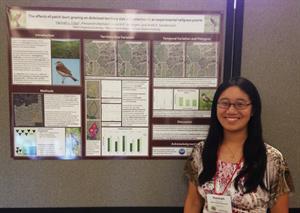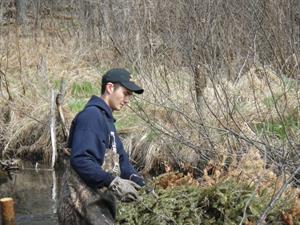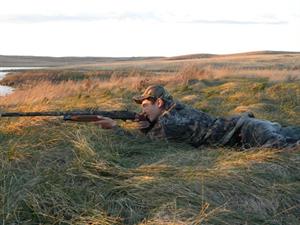The Izaak Walton League funds two $2,500 national scholarships each year to complement scholarships awarded by League chapters and divisions. The national scholarships help educate tomorrow’s conservation leaders by supporting college students pursuing degrees in natural resources and related subjects. These scholarships are made possible with support from League members and a generous annual grant from the Izaak Walton League of America Endowment.
The following students were awarded the League’s National Conservation Scholarship for the 2015-2016 school year.
Hannah L. Clip
 Hannah Clipp is studying wildlife and fisheries resources at West Virginia University while also pursuing a second degree in multidisciplinary studies with a focus on conservation ecology, biology, and English. She expects to complete both degrees in May 2016. Hannah is also a student member of the League’s Harford County (Maryland) Chapter and received a scholarship from the chapter in 2012.
Hannah Clipp is studying wildlife and fisheries resources at West Virginia University while also pursuing a second degree in multidisciplinary studies with a focus on conservation ecology, biology, and English. She expects to complete both degrees in May 2016. Hannah is also a student member of the League’s Harford County (Maryland) Chapter and received a scholarship from the chapter in 2012.
Her career goal is to obtain a PhD in wildlife biology/conservation and work for a federal agency as a certified wildlife biologist specializing in ecological research. “I want to study mammals and birds in order to address wildlife management issues, fulfill research needs, and tackle environmental issues involving biodiversity, restoration, and conservation,” she says. Her commitment to biodiversity issues is reflected in part in her work to establish a student chapter of the Society for Conservation Biology. Hannah served first as the group’s secretary and then as president, when she created a student mentorship program and set up a citizen-science monitoring project.
When asked about conservation challenges, Hannah said that she thinks the two most important conservation issues facing North America over the next decade are the spread of invasive species and global climate change. “Every state in the United States is plagued by invasive species (both plants and animals) that pose a threat to many of the nation’s native species. Because it is notoriously difficult to deal with invasive species once they have become established, prevention and early containment are key,” Hannah said.
 “Changing climates shift traditional ranges for wildlife and plants. The rapid rate of change means that many species will not have time to adapt, which may result in endangerment or extinction,” she explained. “Scientific researchers must investigate the potential impacts of changing climates, and wildlife managers must find ways to conserve negatively affected species.”
“Changing climates shift traditional ranges for wildlife and plants. The rapid rate of change means that many species will not have time to adapt, which may result in endangerment or extinction,” she explained. “Scientific researchers must investigate the potential impacts of changing climates, and wildlife managers must find ways to conserve negatively affected species.”
One of her professors told us that Hannah “is truly exceptional and is in the top one percent of students that I have advised and/or taught in the 16 years that I have been at West Virginia University. Hannah’s commitment to conservation of natural resources and the environment is demonstrated by her substantial and impactful involvement with campus activities, research, and service.”
Outside her studies, Hannah loves to spend time outdoors hiking and watching wildlife. She says that it is “our duty and privilege as managers to conserve natural resources for subsequent generations to use and appreciate just as we do.”
James M. Hansen
 James Hansen is studying wildlife ecology and management at the University of Wisconsin-Stevens Point. After graduation in May 2016, he plans to pursue a master’s degree related to wildlife management and ecology and ultimately would like to work as a wildlife biologist with a natural resource agency. “My life goal is to conserve, restore, and protect as much wildlife habitat as possible and introduce as many youth as I can to the great outdoor heritage and life as a conservationist.”
James Hansen is studying wildlife ecology and management at the University of Wisconsin-Stevens Point. After graduation in May 2016, he plans to pursue a master’s degree related to wildlife management and ecology and ultimately would like to work as a wildlife biologist with a natural resource agency. “My life goal is to conserve, restore, and protect as much wildlife habitat as possible and introduce as many youth as I can to the great outdoor heritage and life as a conservationist.”
James is a student member of the League’s Bill Cook Chapter and received a scholarship from the Minnesota Valley Chapter (located near James’ hometown of Mora, Minnesota). An avid outdoorsman, he enjoys hunting, fishing, canoeing, and wood carving. He spent his first two years as an undergraduate at Vermilion Community College, where he served as president and crew leader of the Forestry and Wildlife Club and dedicated almost every weekend to conservation and natural resource activities. He conducted waterfowl surveys for the U.S. Fish and Wildlife Service; helped area Department of Natural Resources wildlife managers with deer, bat, carnivore, and waterfowl surveys; and maintained and collected data on wood duck nest boxes for the U.S. Forest Service. James says he contributed more than 400 hours of volunteer time to ensure proper management of wildlife and forest resources — and thoroughly enjoyed every minute of it. In his first semester at the University of Wisconsin-Stevens Point, James contributed more than 150 volunteer hours to conservation projects.
 “Conservation, to me, is the ultimate responsibility that all humans share to ensure the protection, preservation, and sustainable use of the land’s precious natural resources so that the many generations to come may enjoy and care for them as well,” he said. “I believe that some of the biggest threats to conservation include the loss of biodiversity and the loss of interest in nature among people today. Both will have profound impacts on natural resource management.”
“Conservation, to me, is the ultimate responsibility that all humans share to ensure the protection, preservation, and sustainable use of the land’s precious natural resources so that the many generations to come may enjoy and care for them as well,” he said. “I believe that some of the biggest threats to conservation include the loss of biodiversity and the loss of interest in nature among people today. Both will have profound impacts on natural resource management.”
His advisor at the University of Wisconsin-Stevens Point says that James is “a gifted student, researcher, and professional. He is very passionate about wildlife, the outdoors, and our hunting heritage. Moreover, he is capable of advocating for his passions in articulate and effective ways. I am more confident in the sustainable future of our natural resources because of students like Mr. Hansen.”